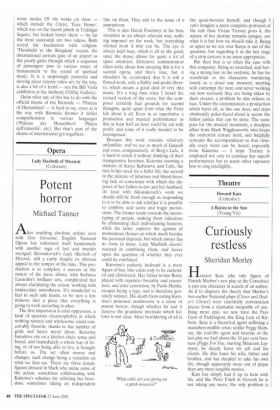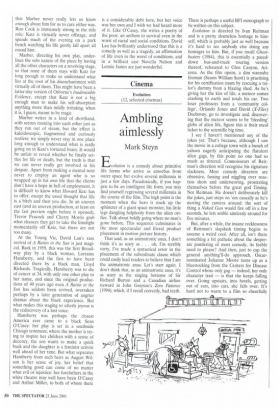Theatre
Howard Katz (Cottesloe) A Raisin in the Sun (Young Vic)
Curiously restless
Sheridan Morley
Howard Katz (the title figure of Patrick Marber's new play at the Cottesloe) is just one character in search of an author. As if to disprove the theory that Marber's two earlier National plays (Closer and Dealer's Choice) were essentially conversation pieces from a dramatist incapable of anything more epic, we now have the Peer Gynt of Paddington, the King Lear of Kilburn. Katz is a theatrical agent suffering a marathon midlife crisis: unlike Peggy Ramsay, the real-life agent and heroine of the last play we had about the 10 per cent business (Peggy For You, starring Maureen Lipman), he deeply hates his job and his clients. He also hates his wife, father and brother, and has decided to take his own life, though apparently more out of pique than any more tangible motive.
Katz has simply had it up to here with life, and like Peter Finch in Network he is not taking any more; the only problem is that Marber never really lets us know enough about him for us to care either way. Ron Cook is immensely strong in the title role: Katz is virtually never offstage, and spends much of the evening on a park bench watching his life gently fall apart all round him.
Marber, directing his own play, underlines the solo nature of the piece by having all the other characters on a revolving stage, so that none of them stays with Katz for long enough to make us understand what lies at the root of his disenchantment with virtually all of them. This might have been a latter-day version of Osborne's Inadmissible Evidence, except that Katz is not a big enough man to make his self-absorption anything more than mildly irritating, when it is, I guess, meant to be tragic.
Marber writes in a kind of shorthand, with scenes running into each other just as they run out of steam, but the effect is kaleidoscopic, fragmented and curiously restless; we simply never stay in one place long enough to understand what is really going on in Katz's tortured brain. It would be unfair to reveal whether he finally settles for life or death, but the truth is that we can never really get involved in his despair. Apart from making a mental note never to employ an agent who is so wrapped up in his own life that the clients don't have a hope in hell of employment, it is difficult to know what Howard Katz has to offer, except the usual thought that life is a bitch and then you die. In an uneven cast (and an uneven production, at least on the last preview night before it opened), Trevor Peacock and Cherry Morris grab what chances they get to take the limelight momentarily off Katz, but there are not too many.
At the Young Vic, David Lan's rare revival of A Raisin in the Sun is just magical. Back in 1959, this was the first Broadway play by a black woman, Lorraine Hansberry, and the first to have been directed there by a black man, Lloyd Richards. Tragically, Hansberry was to die of cancer at 34, with only one other play to her name, and since the original productions of 40 years ago even A Raisin in the Sun has seldom been revived, overtaken perhaps by a later generation of angrier dramas about the black experience. But what makes this staging so utterly joyous is the rediscovery of a lost voice.
Hansberry was perhaps the closest America ever came to a black Sean O'Casey: her play is set in a southside Chicago tenement, where the mother is trying to inspire her children with a sense of decency, the son wants to make a quick buck and the daughter is a feminist activist well ahead of her time. But what separates Hansberry from such heirs as August Wilson is her sense of joy, her belief that something good can come of no matter what evil or injustice: her forefathers in the white theatre may well have been O'Casey and Arthur Miller, to both of whom there is a considerable debt here, but her voice was her own and I wish we had heard more of it. Like O'Casey, she writes a poetry of the poor, an anthem to survival even in the worst of racial and social conditions. David Lan has brilliantly understood that this is a comedy as well as a tragedy, an affirmation of life even in the worst of conditions, and in a brilliant cast Novella Nelson and Lennie James are just wonderful.



































































 Previous page
Previous page